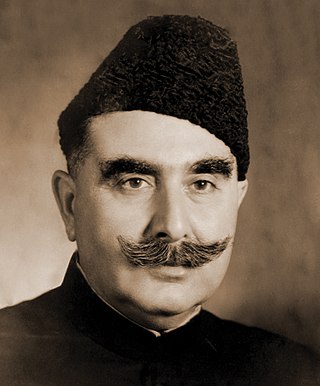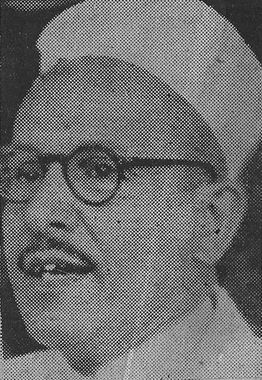Related Research Articles

Anna University is a public state university located in Tamil Nadu, India. The main campus is in Chennai. It was originally established on 4 September 1978 and is named after C. N. Annadurai, the former Chief Minister of Tamil Nadu.

The Indian Union Muslim League is an Indian political party primarily based in the Indian state of Kerala. It is recognised as a State Party in Kerala by the Election Commission of India.

Tirunelveli (Tamil: [tiɾɯnelʋeːli], also known as Nellai and historically as Tinnevelly, is a major city in the Indian state of Tamil Nadu. It is the administrative headquarters of the Tirunelveli District. It is the sixth-largest municipal corporation in the state after Chennai, Coimbatore, Madurai, Tiruchirappalli and Salem. Tirunelveli is located 624 km southwest of the state capital Chennai, 58 km away from Thoothukudi, and 73 km from Kanyakumari. The downtown is located on the west bank of the Thamirabarani River; its twin Palayamkottai is on the east bank. Palayamkottai is called the Oxford of South India as it has many schools and colleges. It has several important government offices.

The Constituent Assembly of India was elected to frame the Constitution of India. It was elected by the 'Provincial Assembly'. Following India's independence from the British rule in 1947, its members served as the nation's first Parliament as the 'Provisional Parliament of India'.

Tamil Muslims are Tamils who practise Islam. The community is 5.7 million in India, primarily in the state of Tamil Nadu where 70% of the Muslim community identified themselves as Tamils. The Tamil-speaking Muslims are descendants of marriages between early West Asian Muslims and Tamil women as well as local converts. The community is matrilineal, matriarchal and matrilocal. There is a substantial diaspora, particularly in Southeast Asia, which has seen their presence as early as the 13th century. In the late 20th century, the diaspora expanded to Western Europe, Persian Gulf and North America. A separate Tamil-speaking Muslim population also exists in Sri Lanka known as the Sri Lankan Moors, who do not identify as Tamils but are a mixture of Arab, Persian, South Indian and Malay ancestries of which the Dravidian element is predominant because of centuries of heavy Indian injection. Historically, both these Tamil speaking communities in India and Sri Lanka were known as the Sonakar, which is derived from the term Yona, originally meaning a West Asian.

Sardar Abdur Rab Nishtar was a Pakistani Muslim League politician from North-West Frontier Province.

SirZiauddin Ahmad was an Indian mathematician, parliamentarian, logician, natural philosopher, politician, political theorist, educationist and a scholar. He was a member of the Aligarh Movement and was a professor, principal of MAO College, first pro vice-chancellor, vice chancellor and rector of Aligarh Muslim University, India. He served as vice chancellor of Aligarh Muslim University for three terms.

Nawab Mohammad Ismail Khan (1884–1958) was an eminent Muslim politician and a leading activist of the All-India Muslim League, who stood in the forefront of the Khilafat Movement and Pakistan Movement. Nawab Mohammad Ismail Khan is regarded as one of the founding fathers of the Islamic Republic of Pakistan due to the roles that he fulfilled for the cause of it. His position was described as only second to that of Muhammad Ali Jinnah. This is also evident through the letters that were actively exchanged between the leaders. After the creation of Pakistan, he decisively chose to remain in India.
The anti-Hindi-imposition agitations in Tamil Nadu were a series of agitations that happened in the Indian state of Tamil Nadu during both pre- and post-independence periods. The agitations involved several mass protests, riots, student and political movements in Tamil Nadu concerning the official status of Hindi in the state.

Begum Qudsia Aijaz Rasul was the only Muslim woman in the Constituent Assembly of India that drafted the Constitution of India.
Aladi Aruna (alias) V Arunachalam was an Indian politician. He was the Law Minister of Tamil Nadu. He was elected to the Tamil Nadu legislative assembly as a member of the Dravida Munnetra Kazhagam from Alangulam constituency in the 1967, 1971 and 1996 elections. He was elected to the Lok Sabha, the lower house of India's Parliament, from Tirunelveli constituency in the 1977 elections. He was also a member of the Rajya Sabha, the upper house of India's Parliament, as a member of the Anna Dravida Munnetra Kazhagam. He came into the limelight when he issued a dissent note in the JPC report on the Bofors Scandal against a clean chit to Rajiv Gandhi government. He was murdered in 2004.
P. H. Manoj Pandian is a politician and current Member of the Legislative Assembly for Alangulam constituency. He was elected to the Tamil Nadu legislative assembly as an Anna Dravida Munnetra Kazhagam candidate from Cheranmahadevi constituency in 2001 election and former Member of Parliament from 2010 to 2016.

Mohammed Abdur Rahiman Sahib was an Indian freedom fighter, Muslim leader, scholar, and politician from Kerala. He served as president of Kerala Pradesh Congress Committee(Malabar) in 1939.

M. Muhammad Ismail was an Indian politician and social worker from Tirunelveli, southern Tamil Nadu. He served as the first President of Indian Union Muslim League after the partition of British India. He was popularly known in Tamil Nadu and Kerala as the "Quaid-e-Millat".

K. M. Seethi Sahib (1899—1961), born K. M. Seethi, was an Indian politician and community leader from Kerala. He served as the Speaker of Kerala Assembly during 1960-61.

B. Pocker, Badekkandy, also spelled Poker, title Sahib Bahadur, as an Indian politician and lawyer from Tellicherry, north Kerala, Madras Presidency. He served as a member of the Constituent Assembly of India and as the Member of Parliament from Manjeri Parliamentary Constituency between 1952 and 1962.
Ahmed Ali Enayetpuri was a Bengali writer, journalist, and politician.
Muhammad Abdullah al-Baqi was a Bengali Islamic scholar, writer and politician. As a member of the Central Legislative Assembly, he played an active role in the Indian independence movement. He was a prominent leader of the Ahl-i Hadith movement in North Bengal, and played a significant roles in pre-partition Ahl-i Hadith conferences.

K. Uppi Saheb, or Kottal Uppi Saheb Bahadur, (1891–1972) was an Indian politician and social worker from Kannur, north Kerala.
References
- 1 2 Wright, Theodore P. (September 1966). "The Muslim League in South India since Independence: A Study in Minority Group Political Strategies". American Political Science Review. 60 (3): 579–599. doi:10.2307/1952972. ISSN 0003-0554. JSTOR 1952972. S2CID 143572105.
- ↑ "Constitution of India". www.constitutionofindia.net. Retrieved 26 January 2023.
- ↑ "Eparlib" (PDF). Constituent Assembly Debates.
- ↑ "Freedom First Magazine | The monthly journal of the Indian Committee for Cultural Freedom". www.freedomfirst.in. Retrieved 26 January 2023.
- ↑ "Constituent Assembly of India: Debates". loksabha.nic.in. Retrieved 26 January 2023.
- ↑ "Debates in the Constituent Assembly and thereafter on UniformCivil Code" (PDF). Indian Policy Foundation. 13 November 2020.